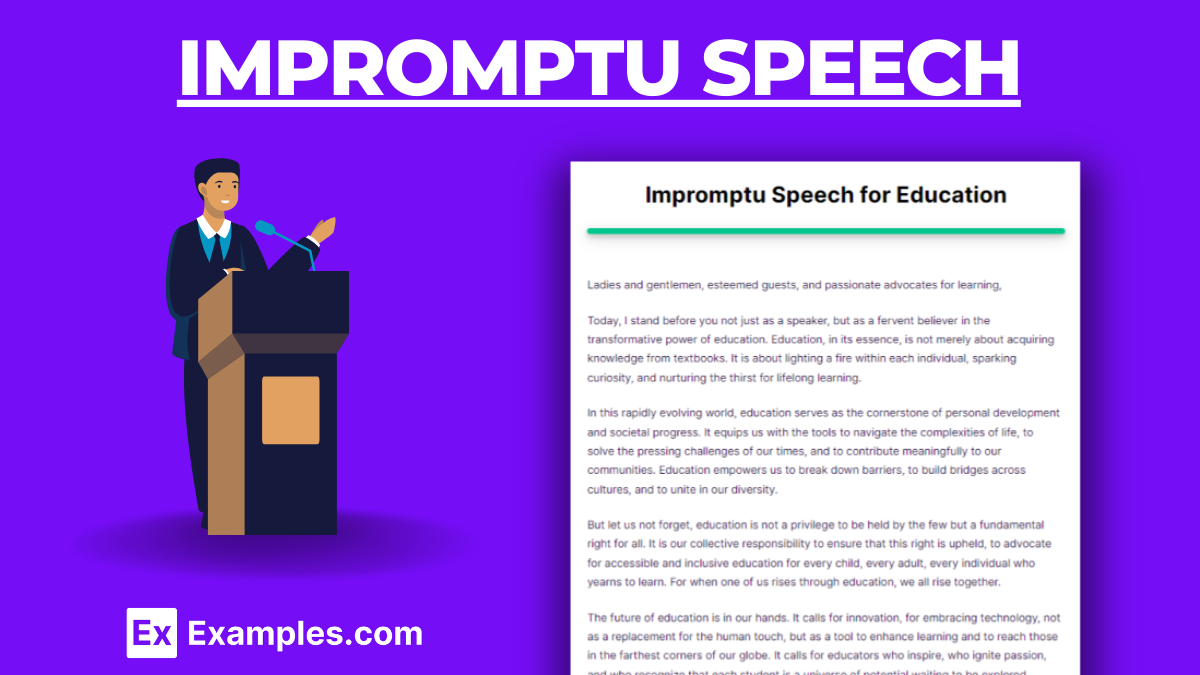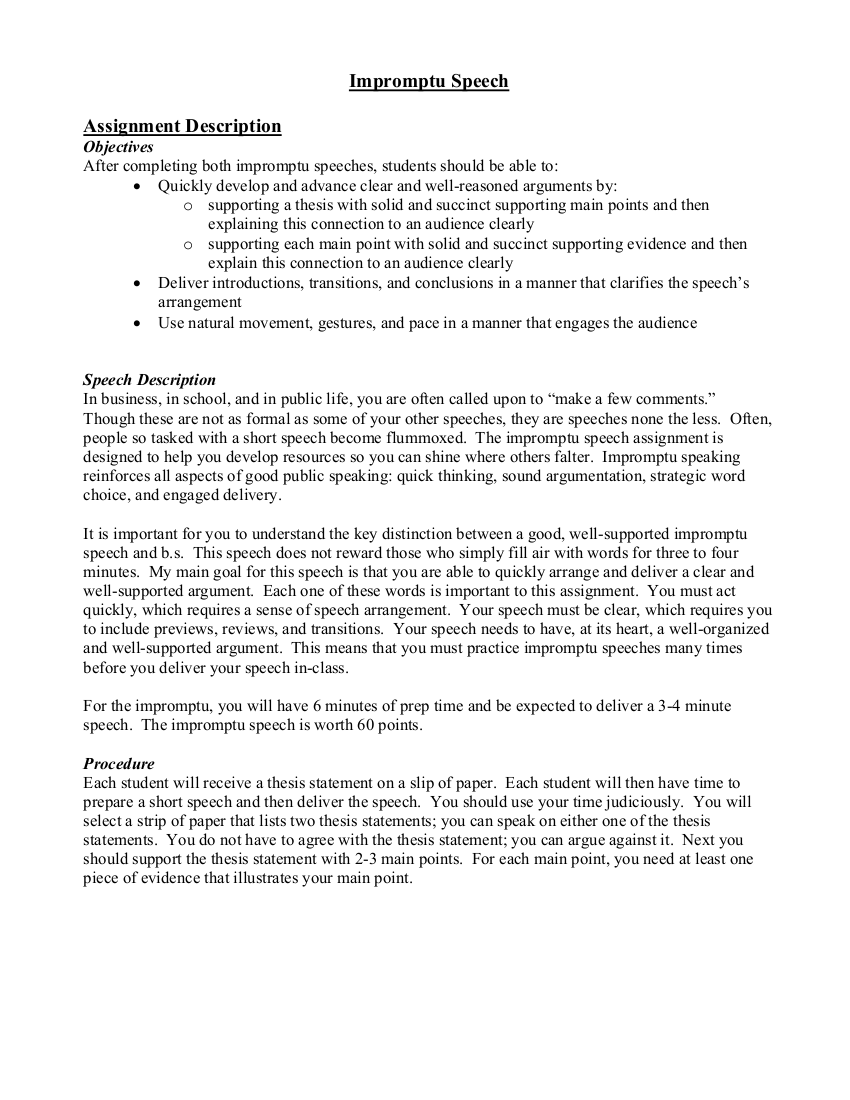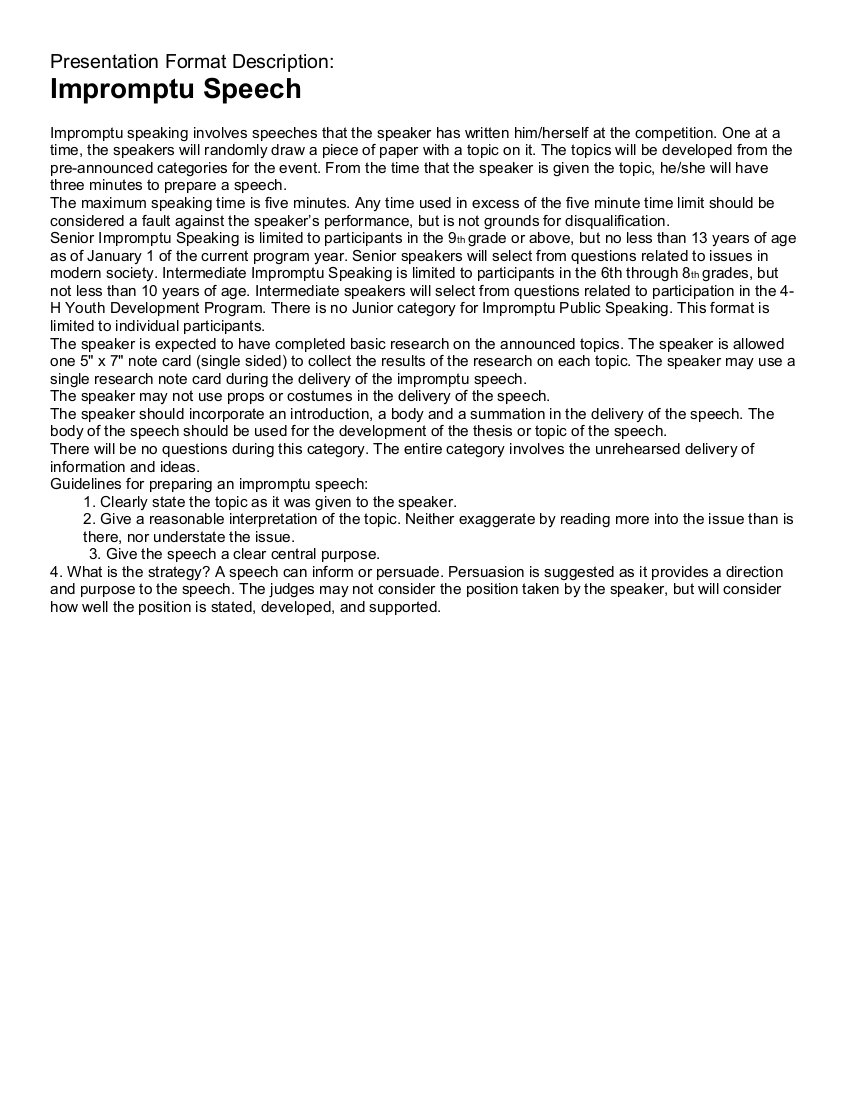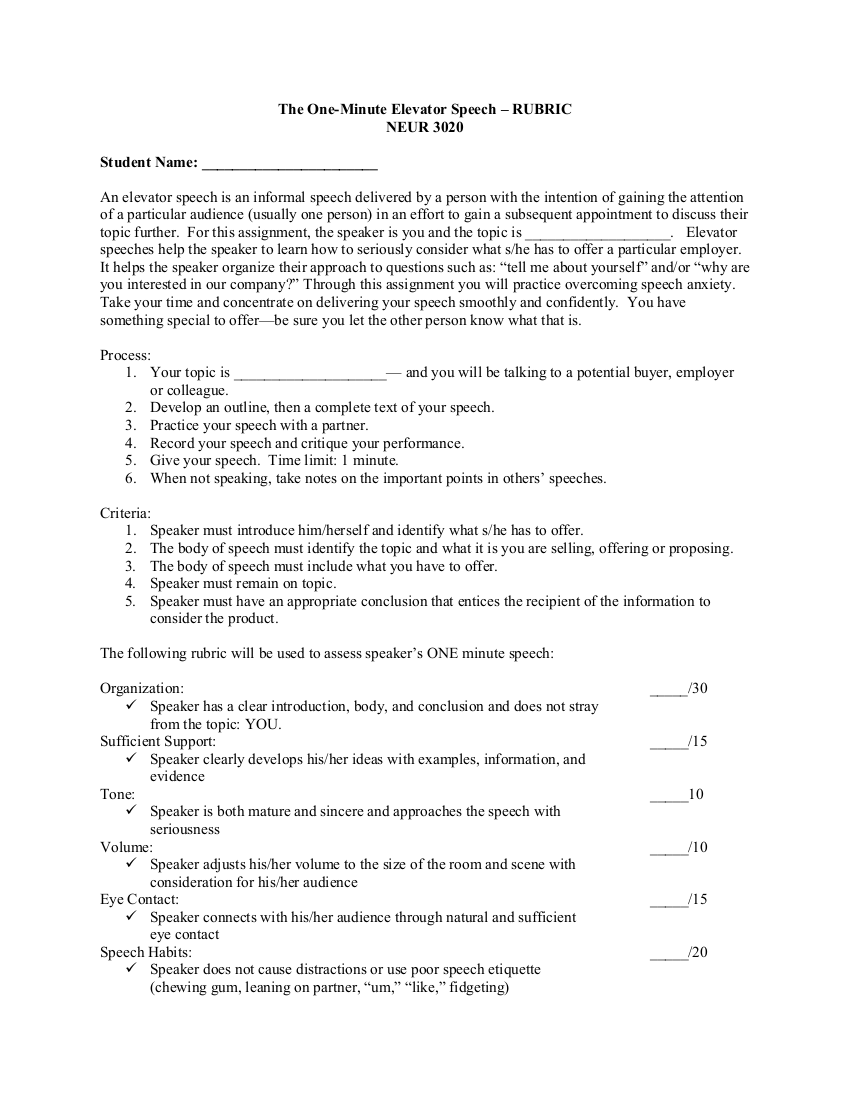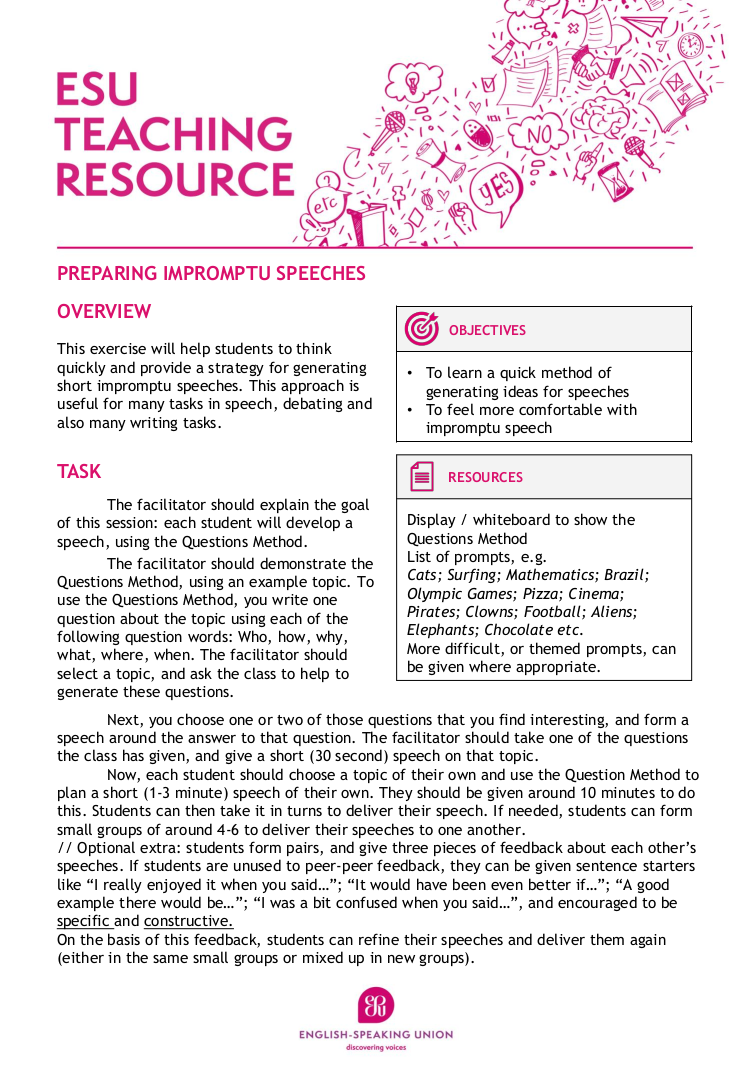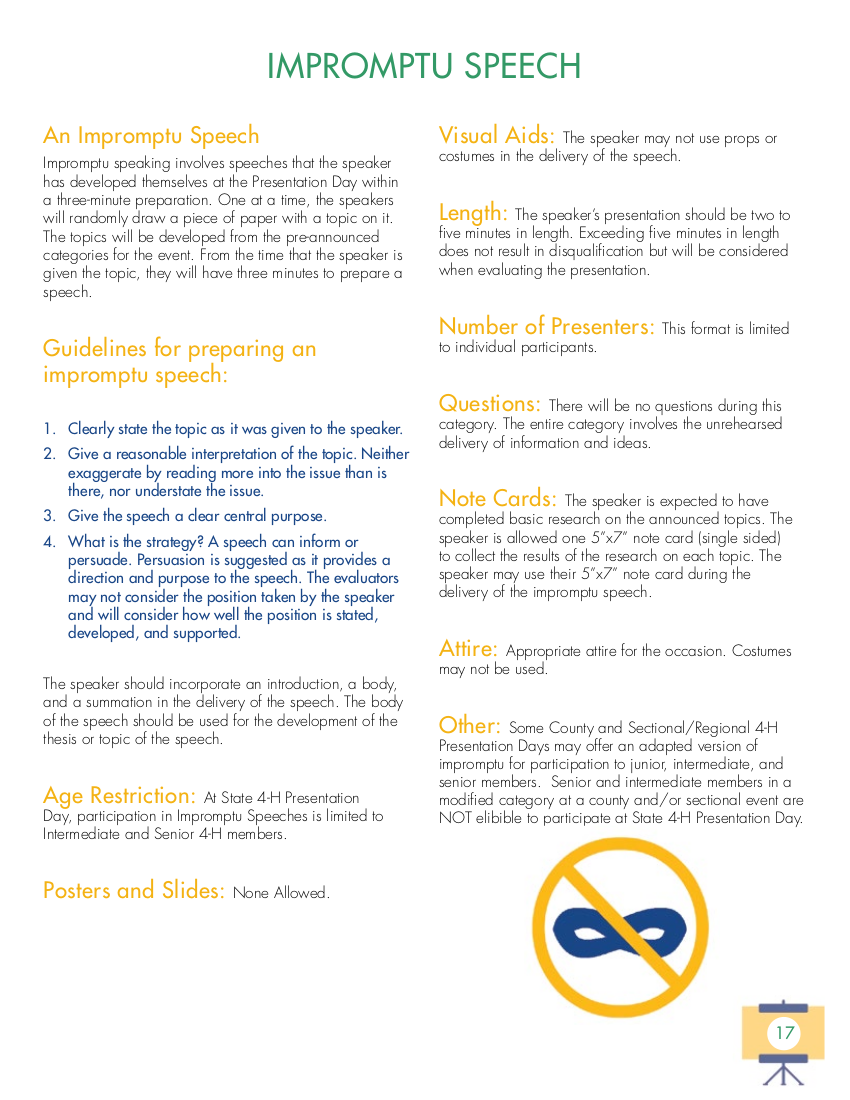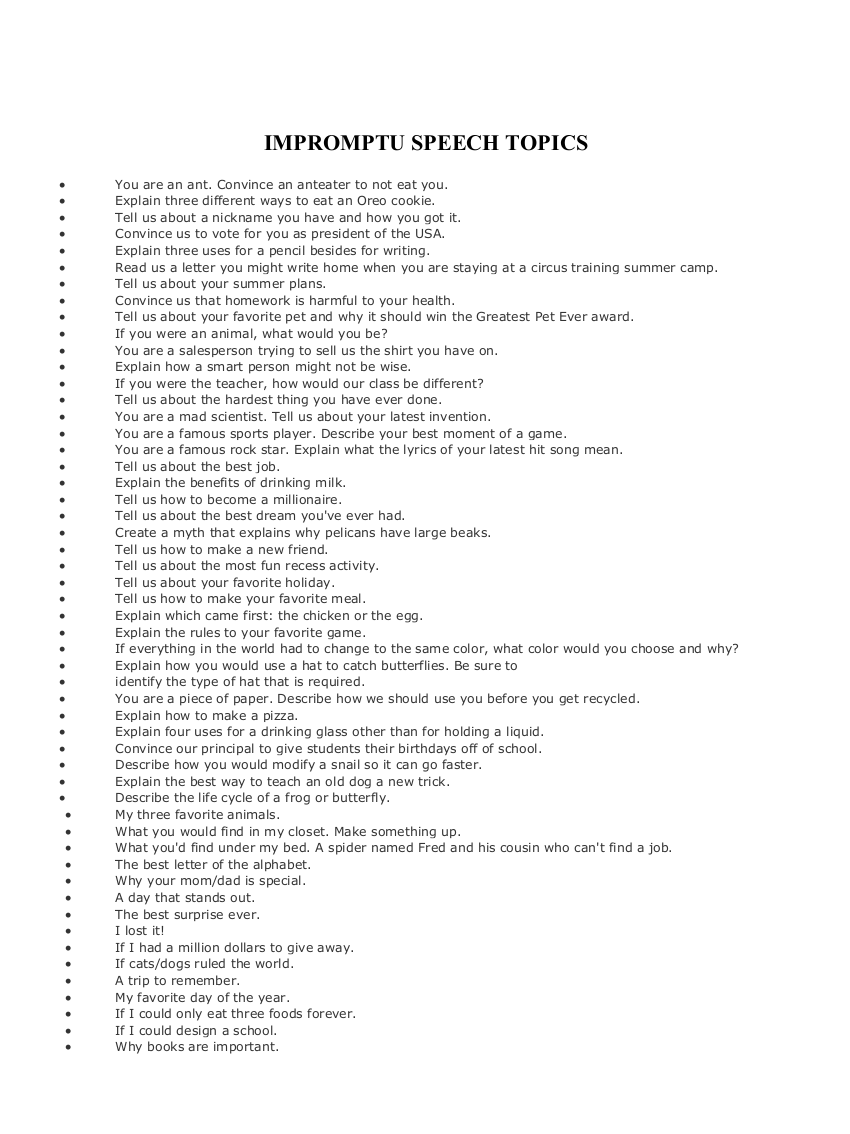30+ Impromptu Speech Examples to Download
If delivering a speech can get nerve-racking for some people, just imagine if they are to deliver an impromptu speech. When we know we are to deliver a speech, we would often go out of our ways just to plan, rehearse, and practice for days, even weeks for some, just to make sure we could ace it. However, when we are asked to deliver a speech on the spot, that’s when things would get challenging for us.
Even though the moments when you would be asked to deliver an impromptu speech could be unexpected, there are some moments when you are most likely to deliver one and such moments are weddings, award presentations or recognition, and even project updates in your workplace. Whatever it is, people would expect that you would be able to deliver an impromptu speech that is smart, witty, insightful, and informative, especially if it’s a formal setting.
If you are not really good at making an impromptu speech but you would always find yourself to be asked to deliver one, then you have to ace your game and surprise everyone who has already witnessed your countless nail-biting situations with the help of the impromptu speech examples that we have compiled here in this article. We have also included some tips on how to deliver an impromptu speech that will surely be of help when you are asked to deliver another impromptu speech.
What is Impromptu Speech? – Definition
An impromptu speech is a type of speech that is given without prior preparation or notice. It requires the speaker to quickly organize their thoughts and ideas on a given topic and deliver a coherent and persuasive presentation on the spot. Unlike prepared speeches, where the speaker has time to research, plan, and rehearse, impromptu speeches are spontaneous and demand a high level of quick thinking, adaptability, and the ability to articulate thoughts clearly and effectively under pressure.
Impromptu speaking is a valuable skill in various contexts, including everyday conversations, business meetings, interviews, social gatherings, and competitive speaking events. It tests a speaker’s ability to think on their feet, use language creatively, and engage with an audience without the safety net of prepared materials. Mastering impromptu speaking can enhance one’s communication skills, confidence, and ability to handle unexpected situations gracefully.
Tips on giving an impromptu speech
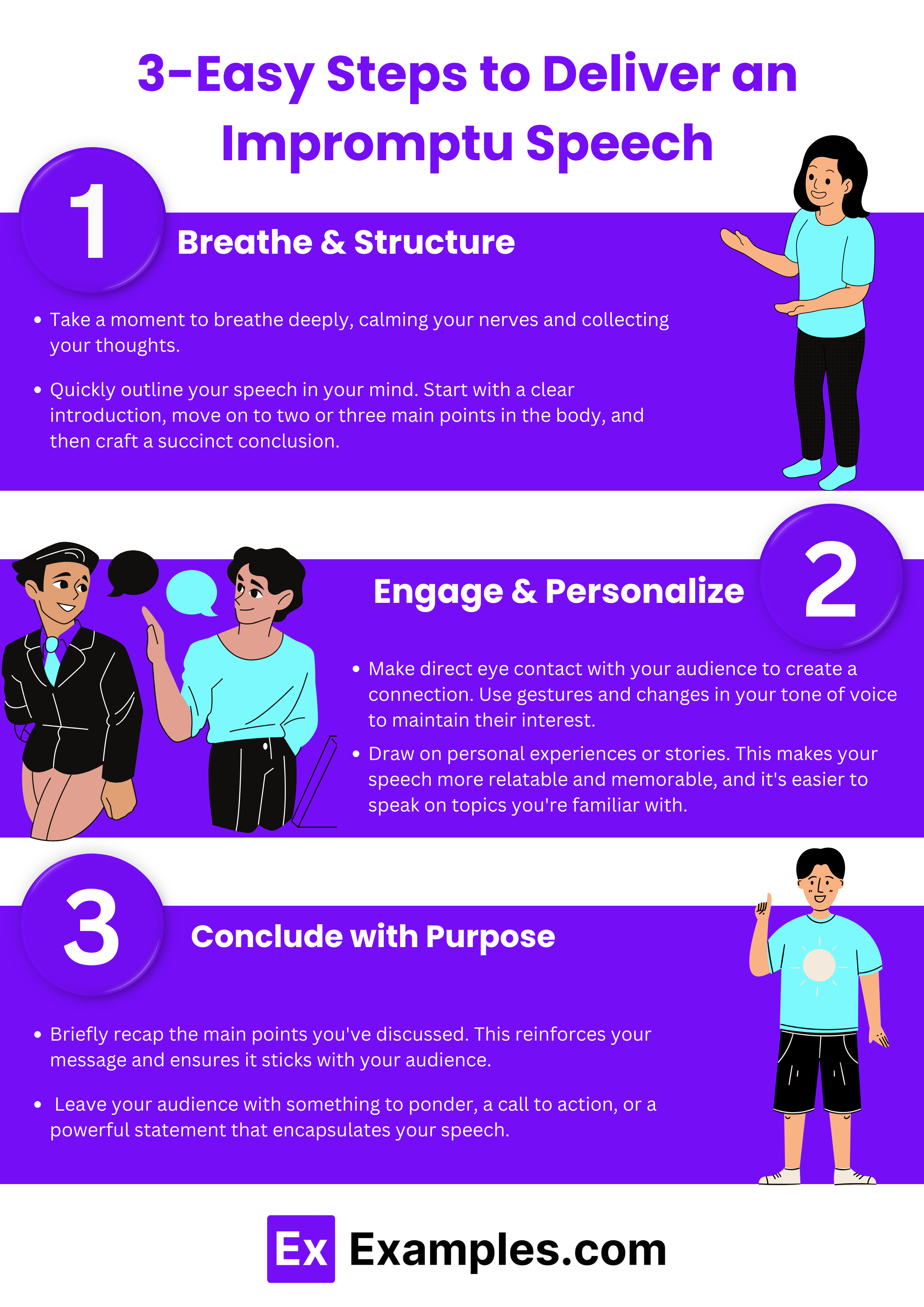
- Stay Calm and Composed: The key to successful impromptu speaking starts with your mindset. Take a deep breath, stay calm, and approach the task with confidence. Remember, your audience is more forgiving than you think.
- Listen Carefully: If you’re given a topic or question, listen carefully to understand it fully. Clarify if necessary before you start speaking to ensure your response is relevant.
- Structure Your Thoughts Quickly: Organize your speech with a clear beginning, middle, and end. You might use the simple structure of stating your main point, supporting it with a few details or examples, and then concluding by summarizing your point.
- Use the PREP Method: Point, Reason, Example, Point (PREP) is a straightforward formula for organizing your thoughts. State your main point, give a reason why it’s important, provide an example or evidence, and restate your point.
- Draw on Personal Experience: Personal stories or examples can make your speech more engaging and relatable. Don’t hesitate to draw on your own experiences when relevant.
- Keep It Simple and Clear: Avoid trying to cover too much in a short speech. Focus on one or two key points that you can discuss clearly and succinctly.
- Engage Your Audience: Make eye contact, use gestures for emphasis, and modulate your voice to keep the audience engaged. Showing enthusiasm for your topic can also help captivate your listeners.
- Practice Active Listening: Improve your impromptu speaking skills by practicing active listening in daily conversations. This helps you become better at formulating quick and coherent responses.
- Embrace Silence: It’s okay to take a moment to collect your thoughts before responding or to pause briefly during your speech. These pauses can actually improve your speech’s clarity and pacing.
- Learn from Every Experience: After each impromptu speech, reflect on what went well and what could be improved. Continuous self-reflection and practice are key to becoming a more effective speaker.
- Stay Informed: Being well-read and informed about a variety of topics can provide you with a wealth of material to draw from when asked to speak spontaneously.
- Practice Under Pressure: Challenge yourself by practicing impromptu speeches in different settings or under time constraints. This can help build your confidence and improve your quick-thinking skills
Impromptu speech frameworks
Impromptu speech frameworks are structured approaches that help speakers organize their thoughts quickly and deliver a coherent speech on the spot. These frameworks provide a guideline for arranging your points, making it easier to speak confidently and clearly under pressure. Here are several effective frameworks for impromptu speaking:
PREP (Point, Reason, Example, Point)
- Point: Start by stating your main point or argument.
- Reason: Explain why this point is important or relevant.
- Example: Provide an example or evidence to support your reason.
- Point: Conclude by restating your main point, reinforcing your argument.
PEEL (Point, Explain, Evidence, Link)
- Point: Begin with the main point you intend to make.
- Explain: Elaborate on your point, providing more detail.
- Evidence: Offer evidence, examples, or anecdotes to support your explanation.
- Link: Conclude by linking back to your main point, showing how the evidence supports it.
What? So What? Now What?
- What?: Describe the situation or topic you’re addressing.
- So What?: Discuss the importance or impact of the situation/topic.
- Now What?: Suggest a course of action or a conclusion based on the discussion.
5 Ws (Who, What, When, Where, Why) and How
- This framework is especially useful for informative or explanatory speeches. Address each of the “5 Ws” to cover the topic comprehensively, followed by “How” to explain processes or solutions.
Problem-Solution-Benefit
- Problem: Start by describing a problem.
- Solution: Propose a solution to the problem.
- Benefit: Highlight the benefits or positive outcomes of implementing the solution.
Cause-Effect-Solution
- Cause: Explain the cause of a particular issue or situation.
- Effect: Describe the effects or consequences of this cause.
- Solution: Offer solutions to mitigate the cause or address its effects.
Compare and Contrast
- This framework involves comparing two or more ideas, situations, or objects, highlighting similarities and differences. It’s effective for persuasive speeches or when making a choice between options.
Past-Present-Future
- Past: Start by discussing the history or background of your topic.
- Present: Describe the current state or relevance of the topic.
- Future: Predict future trends or implications related to the topic.
Three-Point Structure
- Choose three main points you want to make about your topic. This straightforward structure is flexible and can be adapted to most topics, providing clarity and depth without overwhelming the audience.
Impromptu Speech Samples
- Impromptu Speech for Students
- Impromptu Speech for Kids
- Impromptu Speech for Beginners
- Impromptu Speech for Grade 10
- Impromptu Speech for Love
- Impromptu Speech for Family
- Impromptu Speech for Bullying
- Impromptu Speech for Public Speaking
- Impromptu Speech for Education
- Impromptu Speech for Events
- Impromptu Speech for Political Rallies
- Impromptu Speech for Social Media Influencers
- Impromptu Speech for Educational Leaders
- Impromptu Speech for Health And Wellness Coaches
- Impromptu Speech for Technological Innovations
- Impromptu Speech for Corporate Success
- Impromptu Speech for Graduates
Assignment Impromptu Speech Example
Evaluation Impromptu Speech Example
One-Minute Elevator Impromptu Speech Example
Preparing an Impromptu Speech
Presentation Program Impromptu Speech Example
Strategies Impromptu Speech
Topics Impromptu Speech Example
Situations You’d Likely Deliver an Impromptu Speech
As mentioned above, the moments you’d be asked to deliver an impromptu speech is unexpected but there are certain moments and events wherein you would most likely be asked to deliver one. With that, we have listed down some of the situations that you would most likely get asked an impromptu speech:
- The scheduled speaker had informed that he or she would not be able to make it at the last minute and you have been asked to fill in for him or her.
- When you are one of the panelists in a contest, a report or status update, or a project presentation and when you are the one doing the project presentation or a status update and that one of the panelists would ask you questions.
- When you would initiate a question-and-answer session after your prepared speech (the answers you reply to the questions thrown at you by the audience is considered as an impromptu speaking).
- When you would be asked to be interviewed, be it on television, radio, seminars or webinars, or even phone interviews.
- When you would be asked to say a few words or a toast at any kind of gathering, be it among your friends, family members, colleagues, or company.
- When you would join a debate in school or even in your workplace or even when your teacher in class would decide that he or she is going to hold a debate on the spot.
Winning Tips and Strategies for Creating and Delivering Impromptu Speeches
If there is one thing you cannot do with impromptu speeches, it’s the fact that you can never prepare them. However, you can always prepare yourself for when you would be encountering such moments. With that, we have listed down some tips and strategies you can use when you would be asked to deliver a speech right on the spot:
Anticipate the possible situations where you might be called upon to deliver an impromptu speech. We have already listed down the possible and common situations and events above and you could also add on some more situations especially if you have already countless experiences when you would just be caught off guard because you are, again, asked to deliver an impromptu speech. Even though you can never prepare an impromptu speech because you can never know what would happen in a situation, having the knowledge of these situations will enable you to at least prepare and compose yourself.
If you are a prominent person or an individual people have high regard for, just expect that you will always be asked to speak even if you know it yourself that you are not good at public speaking, especially if it is an impromptu one. This is why you should make it a point to have a personal impromptu speech structure that can serve as your default template, framework, or guide when you are asked to deliver an impromptu speech. Having such structure decreases the chances of you rambling in front of your audience since you would already have something to follow in your head.
If you could not think of any personal impromptu speech structure, you could make use or get inspired with some of this easy impromptu speech structure or framework:
- P.R.E.P. which stands for Point, Reason, Example, Point. This structure is easy to follow: you can start off by clearly stating your points, followed by sharing the reasons or your defense as to why you have these points, followed by examples that would illustrate and explain to the audience why you made those points and the reasons for those points, and lastly, end your impromptu speech with the summary of your central point again.
- Issue, Pros vs. Cons, Conclusions. Here is another easy structure that you can follow. You start off by talking about the issue. Then, you follow it by talking about the benefits people can get from it, followed by talking about its drawbacks, and finally end it with your recommendations.
- Answering the 5Ws and 1H. This structure is centralized in addressing and answering the 5Ws and 1H questions or the Who, What, When, Where, Why, and How elements or questions.
Turn your impromptu session into a question-and-answer session. Having a Q and A session always works wonders especially when you are only tasked to fill in for the absence of a scheduled speaker. Most of the time, a scheduled speaker would be given at least 30- to 45-minute speech but in your case where you are only given the task to fill in his or her time without preparation, it would not be wise to dive into having a 30- to 45-minute impromptu speech. Even if you are fully aware and knowledgeable about the topic that you will be making an impromptu speech out of, it is still not easy to prepare a speech about it right on this spot. If you would re-frame the time with a Q and A session, you would be able to easily break up the given time into a series of very small but extremely manageable impromptu speeches which makes it easier for you to answer and generate an impromptu speech out of. The best part of it is that the questions would come directly from the audience, which means that the answers you give to them is something they wanted to hear.
Using your personal stories also works wonders as well because even if you are not really a good speaker to begin with, you would suddenly be an expert at it especially if you would be creating an impromptu speech using your emotional, real, and interesting personal stories. This is because it is much easier for you to speak about the things that happened based on personal experiences.
Most of all, just go easy on yourself. You may be a good speaker but if you are too tensed and you put so much pressure on yourself, you can still go downhill. Don’t aim too much for perfection and just strive to deliver a message that your audience will get insights from. Your audience could probably recognize that you are only asked to give a speech right on the spot and they will surely understand.
Do you feel like you could take on every moment that you’d be asked to deliver an impromptu speech after reading this article? You may also be interested in Commercial Speech Examples in PDF.
Benefits and Opportunities of Impromptu Speech
Benefits
- Enhanced Communication Skills: Regular practice of impromptu speaking sharpens your ability to express thoughts clearly and concisely, improving overall communication skills.
- Quick Thinking: Impromptu speaking fosters quick thinking and mental agility, enabling you to formulate and articulate ideas on the spot.
- Confidence Building: Facing the challenge of speaking without preparation builds self-confidence, not just in public speaking situations but in everyday interactions as well.
- Adaptability: It teaches adaptability, allowing you to adjust your message based on the audience, setting, or feedback you receive in real-time.
- Listening Skills: Effective impromptu speaking often requires active listening, especially when responding to questions or comments, thus enhancing your listening abilities.
- Persuasion Skills: As you learn to construct arguments and convey messages spontaneously, your ability to persuade and influence others improves.
- Stress Management: Over time, engaging in impromptu speaking can help you manage stress and anxiety associated with public speaking and other high-pressure situations.
- Creativity and Innovation: The need to think on your feet can boost creativity, encouraging innovative thinking and problem-solving skills.
Opportunities
- Leadership: Strong impromptu speaking skills are invaluable in leadership roles, where the ability to communicate effectively and make decisive comments is crucial.
- Career Advancement: Effective communication is a key competency in the workplace. Proficiency in impromptu speaking can open doors to promotions and other career opportunities.
- Networking: Impromptu speaking skills can enhance your networking abilities, making it easier to engage in conversations, make connections, and leave a positive impression.
- Public Speaking: For those interested in public speaking, debate, or politics, impromptu speaking serves as a foundational skill that can lead to more formal speaking engagements and opportunities.
- Educational Benefits: Students can benefit significantly from impromptu speaking, improving their academic presentations, classroom participation, and overall learning experience.
- Social Interactions: On a personal level, the confidence and skills gained from impromptu speaking can enrich social interactions, making you a more engaging and persuasive communicator in social settings.
- Crisis Management: In professional settings, the ability to speak eloquently and calmly during unexpected situations is invaluable, especially in crisis management roles.
- Personal Satisfaction: Mastering impromptu speaking can bring a deep sense of personal achievement and satisfaction, knowing you can handle spontaneous speaking challenges with poise.
How to Build Impromptu Speaking Skills
Building impromptu speaking skills is a valuable endeavor that can enhance your communication abilities across many areas of life. Here are steps and strategies to improve your impromptu speaking skills:
1. Understand the Basics
- Familiarize yourself with the structure of impromptu speeches and common frameworks, such as PREP (Point, Reason, Example, Point) or the 5 Ws (Who, What, When, Where, Why, and How).
2. Practice Regularly
- Engage in daily practice by giving short, impromptu speeches on random topics. Use a list of prompts or have someone suggest topics.
- Join clubs or groups that practice public speaking, such as Toastmasters International, where you can practice impromptu speaking in a supportive environment.
3. Embrace Opportunities to Speak
- Seize every opportunity to speak in public, whether it’s answering questions in a meeting, giving a toast, or participating in discussions. The more you practice in real situations, the more comfortable you’ll become.
4. Read Widely and Stay Informed
- A broad knowledge base will give you more material to draw from during impromptu speeches. Stay informed about current events, and read widely across different subjects.
5. Listen and Observe
- Pay attention to effective speakers and analyze what makes their impromptu speeches work. Notice their structure, how they engage their audience, and how they handle unexpected questions.
6. Think on Your Feet
- Practice thinking on your feet by putting yourself in situations that require quick thinking. Activities like debating or even improvisational comedy can improve your ability to come up with ideas quickly.
7. Focus on Clear Structure
- Even in impromptu situations, strive to have a clear beginning, middle, and end to your speeches. A clear structure helps keep your thoughts organized and makes your speech more coherent to your audience.
8. Develop Your Listening Skills
- Good impromptu speaking often involves responding to others. By developing your listening skills, you can more effectively tailor your responses to what has been said.
9. Work on Delivery
- Practice using effective body language, making eye contact, and modulating your voice to add interest and emphasis to your speeches.
10. Record and Review
- Record your practice speeches and review them to identify areas for improvement. Pay attention to your ums and ahs, pacing, clarity, and how well you stick to your structure.
11. Seek Feedback
- Get feedback from peers, mentors, or through public speaking groups. Constructive criticism can help you identify strengths and areas for improvement.
12. Embrace Mistakes
- Understand that making mistakes is part of the learning process. Each mistake is an opportunity to improve. Reflect on what went wrong and how you can do better next time.
13. Challenge Yourself
- Gradually increase the complexity of your speech topics or the pressure of your speaking situations to continue pushing your boundaries.
14. Stay Positive
- Maintain a positive attitude toward impromptu speaking. View it as an opportunity to improve and showcase your skills rather than something to fear.
15. Reflect and Adjust
- After each impromptu speech, take a moment to reflect on what went well and what didn’t. Use these insights to adjust and improve for next time.
How to Give a Great Impromptu Speech
- Stay Calm
- Listen and Understand the Topic
- Structure Your Speech
- Use a Familiar Framework
- Open Strong
- Focus on Key Points
- Use Personal Experiences
- Be Concise
- Engage Your Audience
- Conclude with Impact
- Practice Active Listening
- Embrace Pauses
- Learn from Every Experience
- Stay Informed
- Practice Regularly
FAQs
How Do You Prepare for Impromptu Speaking?
To prepare for impromptu speaking, regularly practice speaking on random topics, stay informed about various subjects, and improve your quick thinking and listening skills. Familiarizing yourself with speech structures like PREP can also help.
What Are the Three Parts of an Impromptu Speech?
The three parts of an impromptu speech include the introduction, where you present your main idea, the body, where you expand on your idea with details or examples, and the conclusion, where you summarize and reinforce your main points.
Are Impromptu Speeches Short?
Yes, impromptu speeches are typically short, often ranging from two to five minutes. Their brevity requires the speaker to convey their message concisely and effectively within a limited timeframe.
Why Is Impromptu Speech Difficult?
Impromptu speech is difficult because it requires quick thinking, the ability to organize thoughts rapidly, and confidence in speaking without preparation. The challenge lies in delivering a coherent and engaging speech on the spot.
Is Impromptu Speech a Talent?
While some individuals may naturally excel at impromptu speaking, it is more accurately described as a skill that can be developed and refined with practice, rather than a talent. Continuous practice and learning can significantly improve impromptu speaking abilities.


